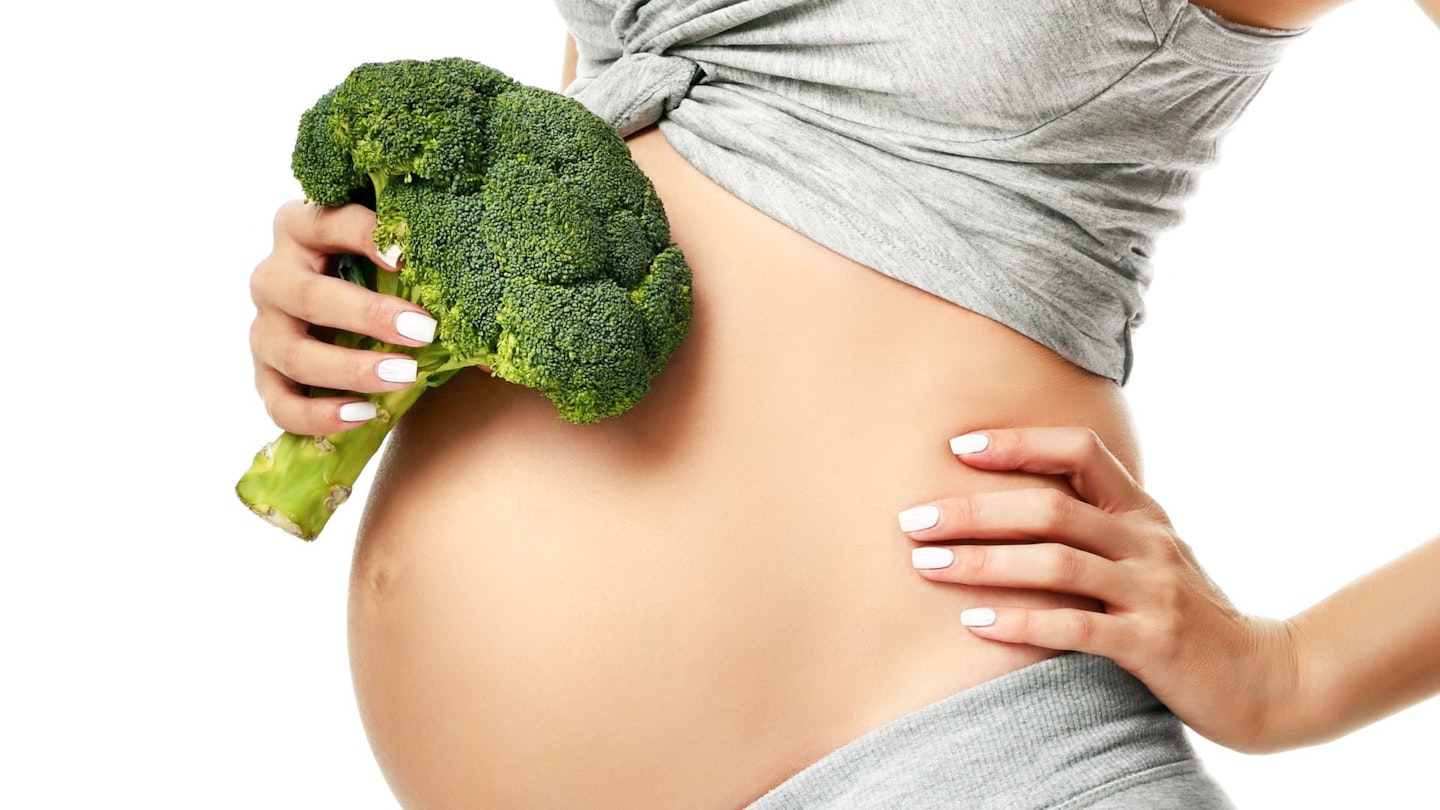
Medically Reviewed by: Rachel Fitz-Desorgher
Whether you're sailing or struggling through your pregnancy, the good news is that at 27 weeks pregnant, you're more than half way through the journey. You're also about to reach a significant milestone next week, inching closer to your third trimester.
To find out more about what your body and baby will be doing at 27 weeks pregnant, we spoke to author, infant feeding consultant, parenting consultant Rachel Fitz-Desorgher who has over 30 years' experience as a specialist midwife. Here, she shares practical tips to guide you through this stage.
How many months pregnant is 27 weeks?
At 27 weeks pregnant, you're in month six of your pregnancy so only three months left to go! This means you're in the last week of your second trimester.
27 weeks pregnant symptoms
Itchy belly
While itching in pregnancy is common, you might find your bump beginning to itch a little bit more. We can become more sensitive in pregnancy and Rachel Fitz-Desorgher recommends avoiding fabric softener and using unperformed laundry detergent when you're pregnant. When your bump is growing, the stretching skin and stretch marks can cause itching. Rachel also notes that itchy skin can be a sign of Cholestasis especially on the palms and feet. If you have itching, tell your midwife so she do tests to rule it out.
Backache
Your growing bump can put pressure on your back, causing back pain. If you haven't already bought one, a pregnancy pillow can help to relieve backache when you're asleep, or relaxing on the sofa. Rachel suggests contacting a pregnancy physiotherapist if you're really struggling and suffering, and mentioning it to your midwife so they can help too.
Cramp or Restless legs
You might also be suffering from restless legs or pregnancy leg cramps. These usually start in the second trimester and may get worse in the evening. A frustrating symptom, your leg (particularly your calf) muscle may spasm. They're most likely to occur when you’ve been sitting or lying still for a while. Try drinking plenty of water, gentle exercise such as walking or yoga, and introducing more magnesium and potassium to your diet. Rachel also recommends kneeling so there's pressure on the front of your shins to soothe and settle the spasms.
Bleeding gums
Make sure you visit your dentist throughout your pregnancy, as bleeding gums is a common side effect of hormone changes in your pregnancy. Take extra good care of your teeth and gums by brushing twice a day and flossing. Remember that dental care is free in pregnancy and for a year afterwards so take advantage of it.
Heartburn
A mix of hormone changes, your expanding womb pressing on your stomach and relaxing of muscles in the oesophagus can let acid move back out of the stomach. There are a number ways you can treat pregnancy heartburn including drinking milk and avoiding spicy or fatty foods.
Headaches
More common in the first trimester, if you start to experience headaches in your pregnancy after 20 weeks, contact your midwife or GP, particularly if you get a bad, persistent headache. Rachel Fitz-Desorgher suggests taking a couple of paracetamol and if the pain hasn't reduced after an hour, call your midwife or healthcare provider. Rachel also notes that they can be caused by dehydration and skipping meals, so make sure you're looking after yourself.
Stretch marks
Common in pregnancy, stretch marks can appear at any point. They can appear as pink, brown, purple or red streaky lines and they can also be raised and itchy. Try a stretch mark oil to help soothe them, though Rachel notes that you'll have to wait for time to reduce them.
Cystitis
If you're feeling uncomfortable when you go to the toilet, it could be a sign of cystitis, a urinary tract infection, which is a common problem during pregnancy due to your growing uterus and your hormones softening the connective tissue of the urethra. Drink plenty of water and if you think you have the symptoms of cystitis, get checked by your midwife as soon as possible.
Dizziness
Hormonal changes, low iron, blood pressure or your growing uterus puts pressure on your blood vessels which can lead to reduced blood flow to the brain. This can cause dizziness or faintness. To stay on top of these symptoms, make sure you stay hydrated and eat snacks or small meals throughout the day to keep your blood sugar at a good level.
Nausea and unusual food cravings
Most women will experience food aversions or cravings during their pregnancy, but you might notice more unusual food cravings around this time and you may also find that nausea starts to come back. Boo!
Baby development at 27 weeks pregnant
At 27 weeks pregnant your baby weighs around 2lbs which is almost double the weight they were four weeks ago. They're around 14 and a half inches long, making them about the same size as a head of cauliflower or broccoli.

Body
Your baby’s organs like their lungs, brain and digestive system are still maturing and your little one is putting on the pounds which is great. Your baby will continue to be supplied with oxygen by your placenta via the umbilical cord until they are born.
Brain development
Your baby’s brain is really active these days, as more brain tissue is developing. They're an active foetus, sleeping and waking up regularly, opening and closing their eyes and sucking their fingers too.
Movement
If you’re feeling any small rhythmic movements that feel like belly spasms, don’t be alarmed: they're just baby hiccups. Don’t fret, as these movements are usually short-lived and don’t harm your baby at all.
Your baby is as snuggly as ever too, most babies this age still like to assume the cosy curled position inside the uterus, also know as the foetal position.
Hearing
In other exciting news, your baby’s auditory development will be better than ever as the network of nerves to the ears matures, and they may now recognise both yours and your partner’s voices, though they'll be muffled. So go ahead and sing or talk to your baby at 27 weeks, it's all good preparation for them being soothed by your voice after birth.
Eyes
Your baby’s eyes will also be developing. They may open their eyes just a little bit for the first time taking in the world around them. The irises – the coloured part of the eye – will have started to develop pigment by now. Many babies are born with blue eyes because they’re still making melanin - this will continue to develop once they're out of the womb and exposed to daylight.
Your body at 27 weeks pregnant
You’ve probably noticed that you’re starting to gain some baby weight and may be feeling uncomfortable and bloated. This is due to the pregnancy hormone, progesterone, and because your stomach is being stretched by your baby.
The chances are you've felt baby's movement at 27 weeks - in fact, the NHS recommends talking to your midwife if you've had no movement by 24 weeks. As the NHS says, there's no set number of times you should feel your baby moving through the day - they'll have their own pattern which you'll start to recognise. If you feel them moving less than usual, call your midwife or maternity unit so they can check your baby's movements and heartbeat.
Breasts
Rachel notes that your breasts are likely to have increased in size so make sure you're still wearing the right bra size for you now and get measured if you're not sure. You don't have to do anything to prepare them for breastfeeding.
Swelling
Commonly affecting the feet, ankles and hands, swelling is a common symptom in pregnancy and there are a few things you can do to help reduce swollen feet in pregnancy. Medically known as edema, it occurs when fluids build up in your body tissues. While it's temporary, it can be uncomfortable especially in the heat. Now is a good time to get comfy shoes and take off any rings but be sure to stay hydrated as this can help. The NHS suggests that if the swelling seems to be excessive or is accompanied by a severe headache or other symptoms, check with your doctor as it could be a sign of pre-eclampsia.
Constipation and piles
Irregular bowel movements and sluggish digestion are uncomfortable and a nuisance, but perfectly common in pregnancy. Constipation and piles are also common as you come to the end of your second trimester. Try to get plenty of fibre in your diet by eating wholemeal grains, lots of fruit and veg and pulses like beans and lentils. Remember to drink water. Iron supplements can make constipation worse so do speak to your GP if you're very uncomfortable.
Looking after yourself at 27 weeks pregnant

Eat smaller meals
You might find yourself getting fuller quicker with regular meals, so help your changing tummy and go for smaller, more regular meals that are easier to digest. Try half a sliced avocado on wholemeal bread, summer fruits and natural yoghurt topped with chopped nuts or a ham and salad pitta bread. And remember that it's still important to avoid certain foods when you're pregnant.
Try pregnancy yoga
To help with cramps, try some gentle pregnancy yoga stretches such as straightening out your leg and flexing your ankle and toes. Going for a quick walk can sometimes help, too.
Pelvic floor exercises
You're probably a little sick of hearing this, but keep toning up your pelvic floor muscles with some simple pelvic floor exercises is really important before birth and even after.
Snack before bed
To try and prevent nocturnal cramps from happening by tucking into snacks containing calcium and magnesium, such as a glass of milk and a banana. A magnesium spray may also be a good idea.
Other things to consider at 27 weeks pregnant
Flying at 27 weeks pregnant
This is likely to be the last week you'd be able to fly without a letter from your doctor according to the NHS. Bear in mind there are some travel vaccinations you won't be able to have, and if you are flying, make sure you walk around and stay hydrated as long-distance travel (longer than 4 hours) carries a small risk of blood clots ). There are plenty of things you can do to make flying when pregnant safer and more comfortable. For instance, you could consider buying a pair of compression stockings to help reduce leg swelling.
FAQs 27 weeks pregnant
Does the 3rd trimester start at 27 or 28 weeks?
Your third trimester starts from week 28 of your pregnancy and ends at 40 weeks or when you give birth.
What not to do at 27 weeks pregnant?
It's still important to avoid certain foods when you're pregnant like undercooked meat, raw fish, unpasteurised milk, alcohol and restrict how much caffeine you consume. You should avoid heavy lifting too.
About the Expert
Rachel Fitz-D is an active birth teacher, parenting consultant and author of Baby Skin To Skin, with over 30 years working as a midwife and as a parenting consultant. Based in Berkshire, near London, she has appeared on numerous radio programmes, talking about various issues from infant feeding to smacking to humanist parenting. She co-created Henley Birthcare, a unique freelance midwifery and doula service offering bespoke care.
Samantha Ball is a Product & Lifestyle Writer for Mother&Baby and freelanced for the website for two years before joining the team full time. She's a mum of two and loves browsing for the best products and cute outfits.
